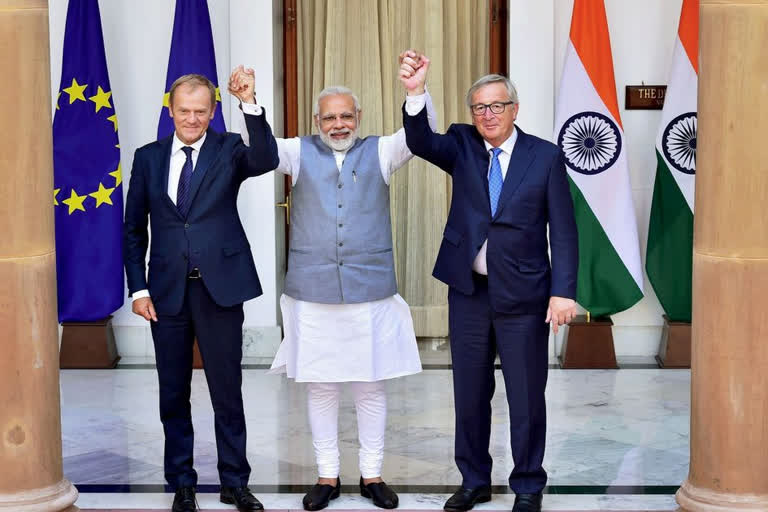New Delhi: India and the European Union (EU) are expected to deliberate extensively on ways to expand overall economic engagement, offset adverse impact of the coronavirus pandemic and strengthen multilateralism in their online summit talks on Wednesday, official sources said.
The 15th India-EU summit, which was scheduled to be held in March in Brussels was delayed due to coronavirus outbreak, will be held via video conference on July 15.
The virtual meeting will be co-chaired by Prime Minister Narendra Modi, European Council President Charles Michel and European Commission President Ursula von der Leyen.
In the summit, the two sides are also expected to delve into finding a way forward to resume talks on the long-pending free trade agreement (FTA) which is known as EU-India Broad-based Trade and Investment Agreement (BTIA).
The 27-nation EU, which was as a whole India's largest trading partner in 2018, is a strategically important region for India.
India's bilateral trade with the EU in 2018-19 stood at USD 115.6 billion with exports valued at USD 57.17 billion and imports worth USD 58.42 billion. The defence and security cooperation between the two sides is also on an upswing.
As per sources, the summit will aim to further advance strategic engagement with a focus on expanding economic ties, strengthening multilateralism to effectively deal with global challenges and confronting adverse impact of the coronavirus pandemic.
It has been felt that there was a lack of leadership for a coordinated approach to effectively deal with the pandemic and the two sides are expected to deliberate on having a common approach in finding a solution to it, the sources said.
Asked whether the issue of the origin of the coronavirus may figure in the talks, the sources said there has been a lot of interest in Europe in knowing about it as well as on the initial response system.
On the FTA, the sources said, the summit will be critical in finding a way forward and that the new leadership of the 27-member bloc has shown great interest in India.
The BTIA talks have been stalled since May 2013, when both sides failed to bridge substantial gaps on crucial issues, including data security status for the IT sector.
Launched in June 2007, negotiations for the proposed agreement have witnessed many hurdles as both sides have major differences on crucial issues.Besides demanding significant duty cuts in automobiles, the EU wants tax reduction on wines, spirits and dairy products, and a strong intellectual property regime.
On the other hand, India is asking that it be granted data secure nation status by the EU. The country is among the nations not considered as data secure by the EU.
There has been a renewed interest in the FTA from both sides after India pulled out of the Regional Comprehensive Economic Partnership (RCEP).
India's bilateral investment protection treaties with individual European countries have lapsed in the last few years. The EU wanted the pacts to continue until they are replaced by the FTA which will have provisions for investment protection.
Asked about the motion on India's Citizenship Amendment Act (CAA) in European Parliament earlier this year, the sources said the EU has already clarified that the parliamentary activities do not reflect the views of the bloc.
PTI



